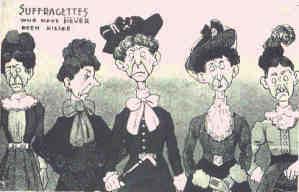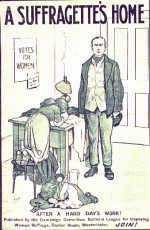 Suffragettes - who have never been kissed Postcard. John Hassall, 1912 |
 A suffragette's home. After a hard day's work! Postcard. John Hassall, 1912 |
 Suffragettes - who have never been kissed Postcard. John Hassall, 1912 |
 A suffragette's home. After a hard day's work! Postcard. John Hassall, 1912 |